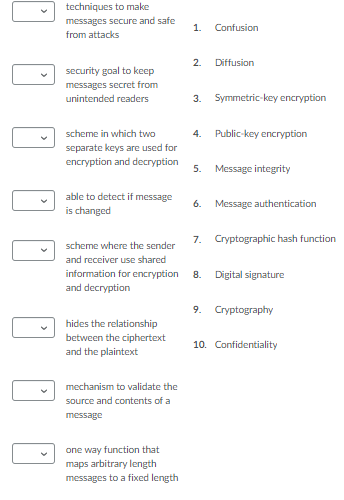techniques to make messages secure and safe from attacks 1. Confusion 2. Diffusion security goal to kep messages secret from unintended readers 3. Symmetric-key encryption 4. Public-key encryption scheme in which two separate keys are used for encryption and decryption 5. Message integrity able to detect if message is changed 6. Message authentication 7. Cryptographic hash function scheme where the sender and receiver use shared information for encryption 8. and decryption Digital signature 9. Cryptography
techniques to make messages secure and safe from attacks 1. Confusion 2. Diffusion security goal to kep messages secret from unintended readers 3. Symmetric-key encryption 4. Public-key encryption scheme in which two separate keys are used for encryption and decryption 5. Message integrity able to detect if message is changed 6. Message authentication 7. Cryptographic hash function scheme where the sender and receiver use shared information for encryption 8. and decryption Digital signature 9. Cryptography
Computer Networking: A Top-Down Approach (7th Edition)
7th Edition
ISBN:9780133594140
Author:James Kurose, Keith Ross
Publisher:James Kurose, Keith Ross
Chapter1: Computer Networks And The Internet
Section: Chapter Questions
Problem R1RQ: What is the difference between a host and an end system? List several different types of end...
Related questions
Question

Transcribed Image Text:techniques to make
messages secure and safe
1.
Confusion
from attacks
2.
Diffusion
security goal to keep
messages secret from
unintended readers
3. Symmetric-key encryption
scheme in which two
4. Public-key encryption
separate keys are used for
encryption and decryption
5.
Message integrity
able to detect if message
6.
Message authentication
is changed
7.
Cryptographic hash function
scheme where the sender
and receiver use shared
information for encryption
8.
Digital signature
and decryption
9. Cryptography
hides the relationship
between the ciphertext
10. Confidentiality
and the plaintext
mechanism to validate the
source and contents of a
message
one way function that
maps arbitrary length
messages to a fixed length
Expert Solution
This question has been solved!
Explore an expertly crafted, step-by-step solution for a thorough understanding of key concepts.
Step by step
Solved in 2 steps

Recommended textbooks for you

Computer Networking: A Top-Down Approach (7th Edi…
Computer Engineering
ISBN:
9780133594140
Author:
James Kurose, Keith Ross
Publisher:
PEARSON

Computer Organization and Design MIPS Edition, Fi…
Computer Engineering
ISBN:
9780124077263
Author:
David A. Patterson, John L. Hennessy
Publisher:
Elsevier Science

Network+ Guide to Networks (MindTap Course List)
Computer Engineering
ISBN:
9781337569330
Author:
Jill West, Tamara Dean, Jean Andrews
Publisher:
Cengage Learning

Computer Networking: A Top-Down Approach (7th Edi…
Computer Engineering
ISBN:
9780133594140
Author:
James Kurose, Keith Ross
Publisher:
PEARSON

Computer Organization and Design MIPS Edition, Fi…
Computer Engineering
ISBN:
9780124077263
Author:
David A. Patterson, John L. Hennessy
Publisher:
Elsevier Science

Network+ Guide to Networks (MindTap Course List)
Computer Engineering
ISBN:
9781337569330
Author:
Jill West, Tamara Dean, Jean Andrews
Publisher:
Cengage Learning

Concepts of Database Management
Computer Engineering
ISBN:
9781337093422
Author:
Joy L. Starks, Philip J. Pratt, Mary Z. Last
Publisher:
Cengage Learning

Prelude to Programming
Computer Engineering
ISBN:
9780133750423
Author:
VENIT, Stewart
Publisher:
Pearson Education

Sc Business Data Communications and Networking, T…
Computer Engineering
ISBN:
9781119368830
Author:
FITZGERALD
Publisher:
WILEY